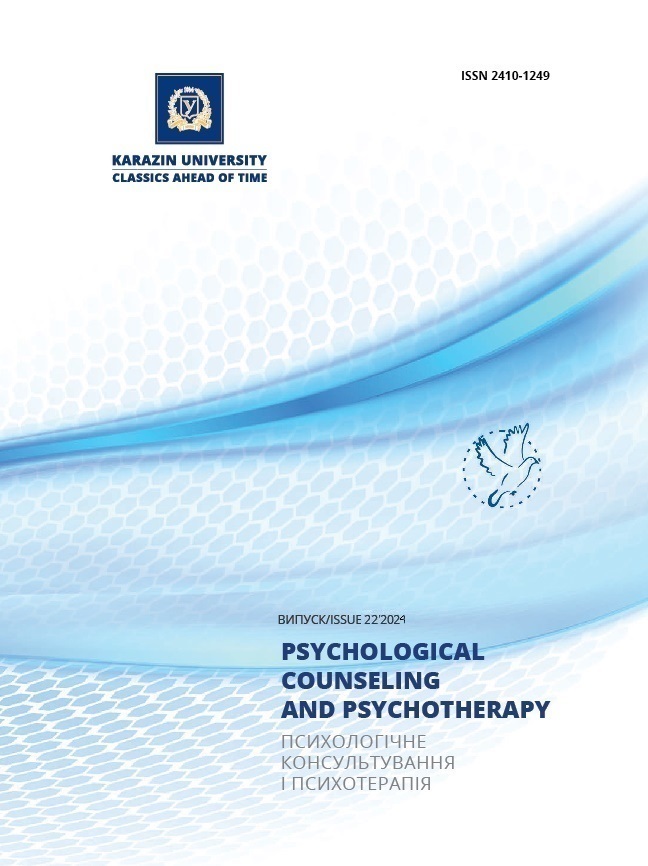Analysis of Family Interaction Depending on the Age of Marriage Partners
Abstract
Formulation of the Problem. In this article the focus is made on the parental subsystem of the family system, where the marriage subsystem is represented by age indicators, and the sibling subsystem is considered through the prism of marriage partners as parents (adult members of the family system). The phenomenon of parenthood is presented as a correspondence to the family system, according to which the parental subsystem includes: 1) parents as marriage partners - husband and wife; 2) parents as a team; 3) parents as separate individuals - mom and dad - with their parental attitudes, attitudes, relationships with children, etc. Taking into account such a view, parenthood is interpreted as a historically specific system of relationships between spouses, as well as parents and children, and is a subsystem whithin the family system as a relatively independent entity. Problem Analysis. The empirical part presented a comparison of the average values of personal and interpersonal factors of family members in relation to their age differences: the 1st age category consisted of subjects aged 20–30 years old; in the 2nd – 31–40 years old; in the 3rd – 41–50 years; in the 4th – 51–60 years old. Conclusions. Trends important for our research were revealed: representatives of the 1st category are characterized by a high degree of closedness, isolation, fixation of interests on the phenomena of their inner world, increased fatigue, irritability, tendency to hypochondria, emotional coldness, etc. Representatives of the 2nd (31-40 years old) and 3rd categories of parents (41-50 years old) demonstrate a lower expressed level of parental protection during the upbringing of a child. They are characterized by an authoritarian parenting style, a strict attitude towards the child, participation in the child's upbringing occurs only when needed or necessary, quite often there is not enough time, energy and attention to the child. Subjects of the 4th category (50-60 years old) have a higher risk of hypochondriacal instructions regarding the child. The "weak point" of such family members is increased insecurity, fear of making a mistake, exaggerated ideas about the child's illness.
Downloads
References
Polishchuk V. M., Ilyina N. M., Polishchuk S. A., Savchenko Y. Y., Mysnyk S. O., Ryabko Y. V., Sheyko G. D. Family Psychology. University Book. 2021. 248 p. ISBN 978-966-680-985-1.
Savchenko, Y., Kozyr, M. Socio-psychological factors and conditions for the formation of responsible parenthood. Pedagogical Education: Theory and Practice. Psychology. Pedagogy, 41(1), 2024. P. 77–83. https://doi.org/10.28925/2311-2409.2024.4111.
Kuchmanych I. M. Conscious Parenting. Teaching and Methodological Guide. Mykolaiv, Ilion, 2017. 192 p.
Lelyukh-Stepanchuk O. O. Psychological aspects of the foundations of parenting. Scientific Bulletin of the Kherson State University. Psychological Sciences. Issue 5, 2015. P. 135-139. http://nbuv.gov.ua/UJRN/nvkhp_2015_5_28.
Bekh I. D. Personality on the path to spiritual values. Monograph. Kyiv - Chernivtsi, "Bukrek", 2018. 320 p.
Boryshevsky M. Y. Psychological patterns of the development of personality spirituality. Monograph. Kyiv, Pedagogical Thought, 2011. 200 p.
Kanishevska, L. Some problems of digital parenting. Scientific Collection "InterConf", (150), 2023. P. 217–221. https://archive.interconf.center/index.php/conference-proceeding/article/view/2971.
Potapchuk E. M., Serga O. O. Implementation of the educational function by a family with adolescents as a psychological problem. Habitus. 2021. Issue 21. P. 183–187.
Kravets V. P. Vasyl Sukhomlynsky on some aspects of the formation of a family member. Ukraine - Europe - World. International Collection of Scientific Papers. 2018. No. 21. P. 231–238.
Voloshenko, M. Youth's perceptions of responsible parenthood. Humanistic Studies. Series "Pedagogy", 13(45), 2021. P. 16–20. https://doi.org/10.24919/2413-2039.13/45.2.
Bandura, A. & Walters, R.H. Social learning and personality development. New York, NY: Holt, Rinehart & Winston, 1963.
Wall G. Mothers’ experiences with intensive parenting and brain development discourse. Women's Studies International Forum, Pergamon, 33, 3, 2010. P. 253–263.
Hays S. The Cultural Contradictions of Motherhood. Yale University Press, Yale, 1996. 288 p.








